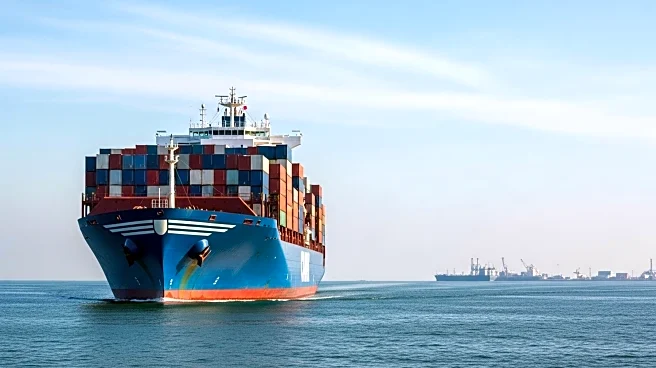What's Happening?
U.S. Customs and Border Protection (CBP) has released guidance regarding the upcoming USTR Section 301 Vessel Fees, which apply to Chinese-owned, operated, or built ships. The fees are set to be implemented on October 14, and operators are required to pay them at least three days before their vessel arrives at a U.S. port. The fees range from $50 per net ton for Chinese-owned or operated ships to $18 per net ton or $120 per container for Chinese-built ships. Car and vehicle Ro-Ros will pay $14 per net ton. CBP emphasizes that the responsibility for determining and paying these fees lies with the vessel operators, not CBP. Payments must be made through electronic bank transfers via the pay.gov website, and vessels without proof of payment may face denial of lading or unlading operations.
Why It's Important?
The implementation of these fees is part of a broader U.S. strategy to penalize China for its shipbuilding practices and influence in the shipping industry. The fees are expected to significantly impact the shipping community, with analysts estimating that the top 10 container carriers could face fees exceeding $3.2 billion in 2026. This move reflects ongoing tensions between the U.S. and China, particularly in trade and economic sectors. The fees aim to reduce China's market dominance and encourage the use of U.S.-built LNG carriers for exports. The shipping industry is closely monitoring the situation, as the fees could alter shipping routes and strategies.
What's Next?
The shipping community is awaiting further guidance from the U.S. Trade Representative, including a FAQ document to clarify details of the fee program. Additionally, the current U.S. federal government shutdown due to a budget dispute may affect the implementation timeline, as the USTR is among the agencies furloughing staff. Carriers are preparing to redeploy vessels in anticipation of the fee program's start, despite the uncertainty surrounding its details. The long-term goal includes increasing U.S.-built LNG carriers for exports, which could reshape the industry.
Beyond the Headlines
The introduction of these fees highlights the geopolitical and economic tensions between the U.S. and China, with potential implications for global trade dynamics. The fees could lead to increased costs for shipping companies, potentially affecting consumer prices and supply chain operations. The focus on U.S.-built LNG carriers aligns with broader efforts to bolster domestic manufacturing and reduce reliance on foreign-built vessels, reflecting a strategic shift in U.S. trade policy.









